Greenbriers!!! Grapevines!!! I shudder at the mere mention of these two plants. Silently, slowly, and with an undeterred relentlessness, these vines spread themselves out among the branches of nearby trees, and the ensuing battle usually results in the destruction of the host tree within a few seasons. Â
In the photo above, you can see how the vines envelop the limbs of the host tree. As the seasonal winds blow through the trees, and as winter snow and ice accumulate on the branches, the limbs eventually snap, resulting in the gradual destruction of the tree. Even the mighty oak succumbs to the tenacity of the vines.
I do not get too concerned about this process in general as it occurs on our property, however there are times when it cannot be ignored. In the photo above, the tree that is being destroyed by the vines happens to be situated next to the barbed wire fence that separates one of our horse pastures from a neighbor’s cattle grazing area. Just as the vines bring down the mighty oak limbs, the falling limbs bring down the sturdy barbed wire fence. So to keep our horses, as well as our neighbor’s cattle happy and in their proper pastures, it is necessary to try to clear out this tangled, thorny mess in order to keep the fence in working order.Â
When vines pull down tree limbs, as in the example above, or when other forces of nature conspire to fell a tree, I sometimes want to clear the debris. In other instances, I may wish to clear a specific area for recreational or aesthetic reasons. Â
What to do with all the limbs? The chainsaw reduces the larger diameter limbs into firewood sized lengths, but this still leaves a lot of smaller branches and saplings to deal with. Many landowners, where not prohibited,  choose to burn their land clearing debris.  I do not burn, and I am not particularly fond of the practice, because it all too often winds up resulting in the following types of photo ops from my front door:
When first confronted with the problem of what to do with tree refuse, given my reluctance to burn, I opted for a heavy-duty wood chipper. After researching the equipment that was available in the price range that my budget allowed, I settled on the following product:
This is a Country Home Products 18hp DR Wood Chipper. It has an electric starter, and can be towed behind my utility vehicle, allowing me to do the chipping anywhere the need arises. It has been a great piece of equipment that has helped me out quite a bit around here. But sadly, it will soon be put up for sale. On eBay, that great resting place for all things no longer needed!
When working with a chipper, it is necessary to wear gloves in order to handle the limbs. The gloves in the photo above are similar to gloves I donned to do a bit of limb chipping a few years ago. There is a cord on the back that allows the wearer to tighten the glove firmly in place. Unfortunately, the cord on the back of my glove managed to get snagged by a limb being drawn into the chipper, and my hand went along for the ride!
Oops- that sure ruined what started out to be a perfectly good day! One lesson to be learned is never wear anything that could possible get caught up in the machinery you choose to operate. After this accident, I used the chipper a few more times, but had to abandon it because the “finger that was” became too sensitive to the vibrations transmitted from the branch being chipped.
OK, we’ve established that I’m paranoid about fires and burning, so that’s out of the question, and operating a chipper is no longer a possibility, so how do I now handle all of the downed limbs and debris that continues to be generated each season?
I now have brush piles scattered in selected locations around the property. By hitching a trailer to the back of the utility vehicle, I gather whatever plant debris accumulates and transport it to these piles. Sure, they’re a bit unsightly, but I don’t have to burn and I don’t have to use a chipper any longer. As an added benefit, the brush piles become coveted habitat for any number of ground dwelling creatures. It seems to be a win-win situation, doesn’t it?

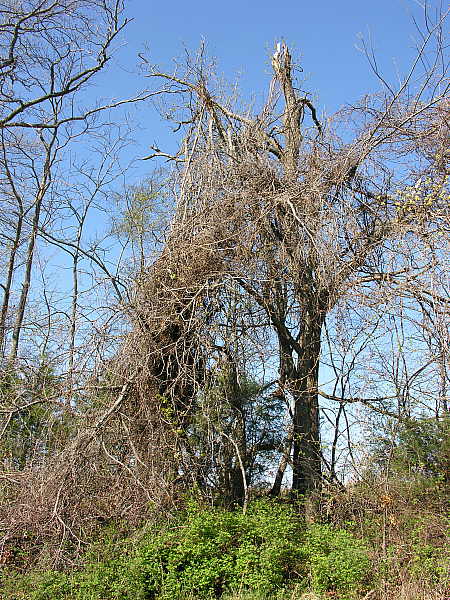
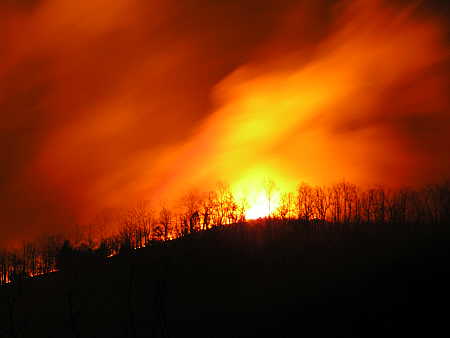
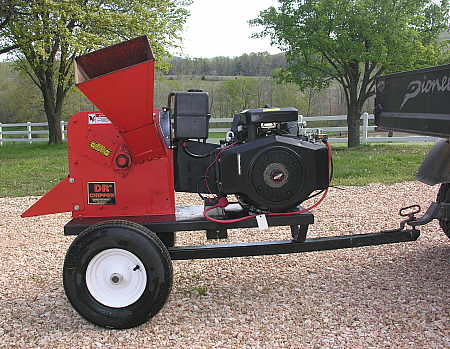
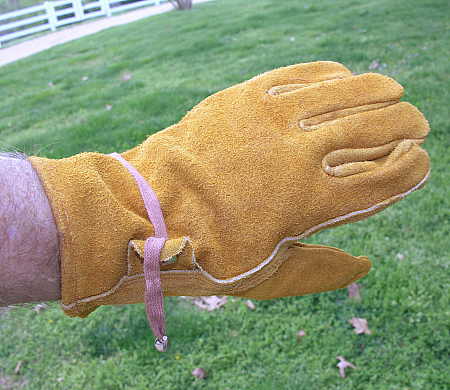
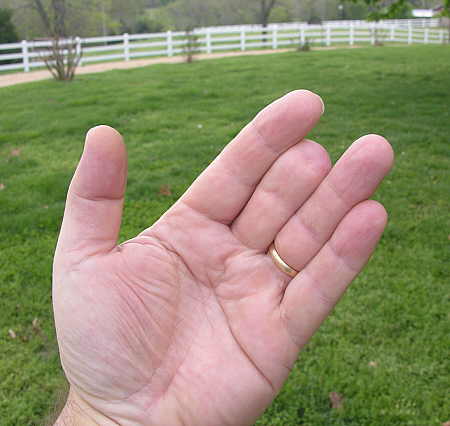
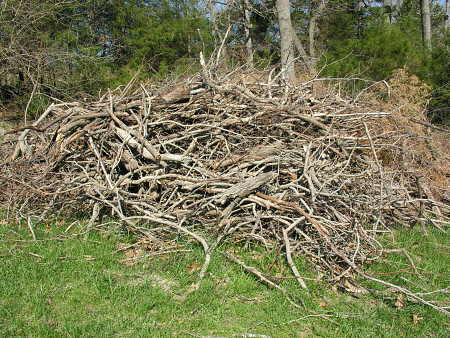


That would make for a bad day. E-mail me the link to your ebay auction if you don’t mind. I’m in the market!
i cut all vines, briers and the invasive multi-floral-rose. i burn piles and brush. i pace in fear the entire time. we now have a goat and hope it will nip-the-bud of fore mentioned weeds.
wood chippers are dangerous business, as you well know. i shy away from them at the earliest opportunity. coveys around here usually lead to unsavory creatures. this is tick and chigger country and we don’t believe in deet so burning helps keep the evil down. we have had good luck with ginueas and chickens managing some of the bad bugs but the battle continues…
Yikes!!
Hal, do you have any movement beyond the distal phalangeal palmar crease?
Duane – Country Home Products has issued a safety bulletin regarding possible fuel tank leakage on these chippers. I have received a replacement fuel tank for the chipper that solves the problem, which I will be installing in the next few days, as well as replacing the starter battery with a new one. I will be listing it on eBay thereafter. I’ll email you with more information – you may want to come and take a look at the chipper before I list it on eBay (maybe we can strike a good deal).
Karl – I’ve been thinking that goats may be a possible solution to the vine problem. I’ll keep that in mind.
Tjilpi – I had to look this one up! If I have read the anatomical chart correctly, here is my answer. The amputation removed the finger right up to the distal interphalangeal joint. However, the proximal interphalangeal joint does have movement. In fact, I worked very hard at keeping the joint limber utilizing hand exercises for the first year after the accident.
Chronic pain is a continuing issue. I have consulted with two neurologists over the issue, and just returned from a meeting with an orthopedic surgeon who specializes in hand injuries. Therapies using medicines have either been ineffective, or left me in a zombie-like mental state. The orthopedic surgeon believes that the risk of developing larger (and more painful) neuromas after surgery is greater than the probability of reducing the pain. I guess you just have to learn to live with the effects of some injuries!
Happy Easter
John Prine said it best with, “Farm machinery eating people’s arms and legs.” Fortunately for you it was just a finger. Sadly, I know many farmers with missing fingers and more. It’s a hazard of the trade I guess.
Now I think I was lucky. They sewed and screwed my finger tip back on.
I feel your pain tho.